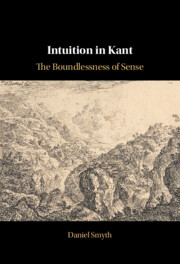Book contents
- Intuition in Kant
- Intuition in Kant
- Copyright page
- Epigraph
- Contents
- Acknowledgments
- Abbreviations, Citations, and Other Conventions
- Introduction
- 1 Reason’s Self-Knowledge and Kant’s Critical Methodology
- 2 Synthetic Judgment and Intuition
- 3 An Apperceptive Approach to the Transcendental Aesthetic
- 4 Exposition, Conceptual Analysis, and Apperception
- 5 Infinity, Discursivity, Givenness
- 6 Prolegomena to a Stufenleiter of Kantian Intuition
- 7 A Stufenleiter of Kantian Intuition, Part I
- 8 A Stufenleiter of Kantian Intuition, Part II
- Bibliography
- Index
6 - Prolegomena to a Stufenleiter of Kantian Intuition
Published online by Cambridge University Press: 07 March 2024
- Intuition in Kant
- Intuition in Kant
- Copyright page
- Epigraph
- Contents
- Acknowledgments
- Abbreviations, Citations, and Other Conventions
- Introduction
- 1 Reason’s Self-Knowledge and Kant’s Critical Methodology
- 2 Synthetic Judgment and Intuition
- 3 An Apperceptive Approach to the Transcendental Aesthetic
- 4 Exposition, Conceptual Analysis, and Apperception
- 5 Infinity, Discursivity, Givenness
- 6 Prolegomena to a Stufenleiter of Kantian Intuition
- 7 A Stufenleiter of Kantian Intuition, Part I
- 8 A Stufenleiter of Kantian Intuition, Part II
- Bibliography
- Index
Summary
Interpreters often cite Kant’s Stufenleiter of representations (A320/B376) as providing a “definition” of intuition. This misunderstands the peculiar logic of Porphyrian classification, which I clarify by reviewing its history. Porphyrian trees do offer conceptual analyses, I argue, but do not purport to provide a uniquely correct, much less exhaustive, account of the analysand. Different orderings of differentia, as well as different differentia, are often possible. Which terms and which kinds of terms appear as differentia in the analysis depends on the goals and constraints on the philosophical inquiry to which the analysis contributes. It is therefore illegitimate to extract a “definition” of intuition from Kant’s Stufenleiter. First, its analysis targets <idea of reason> (not <intuition>), and, second, it does not purport to give a uniquely correct account of that concept (much less of <intuition>), as a definition must.
Keywords
- Type
- Chapter
- Information
- Intuition in KantThe Boundlessness of Sense, pp. 173 - 193Publisher: Cambridge University PressPrint publication year: 2024

